Oil and Gas Attorney Resume Examples

Jul 18, 2024
|
12 min read
Craft your oil and gas attorney resume: drilling down to details that set you apart. Discover tips, tricks, and examples to make your qualifications gush like a Texas oil well.
Rated by 348 people
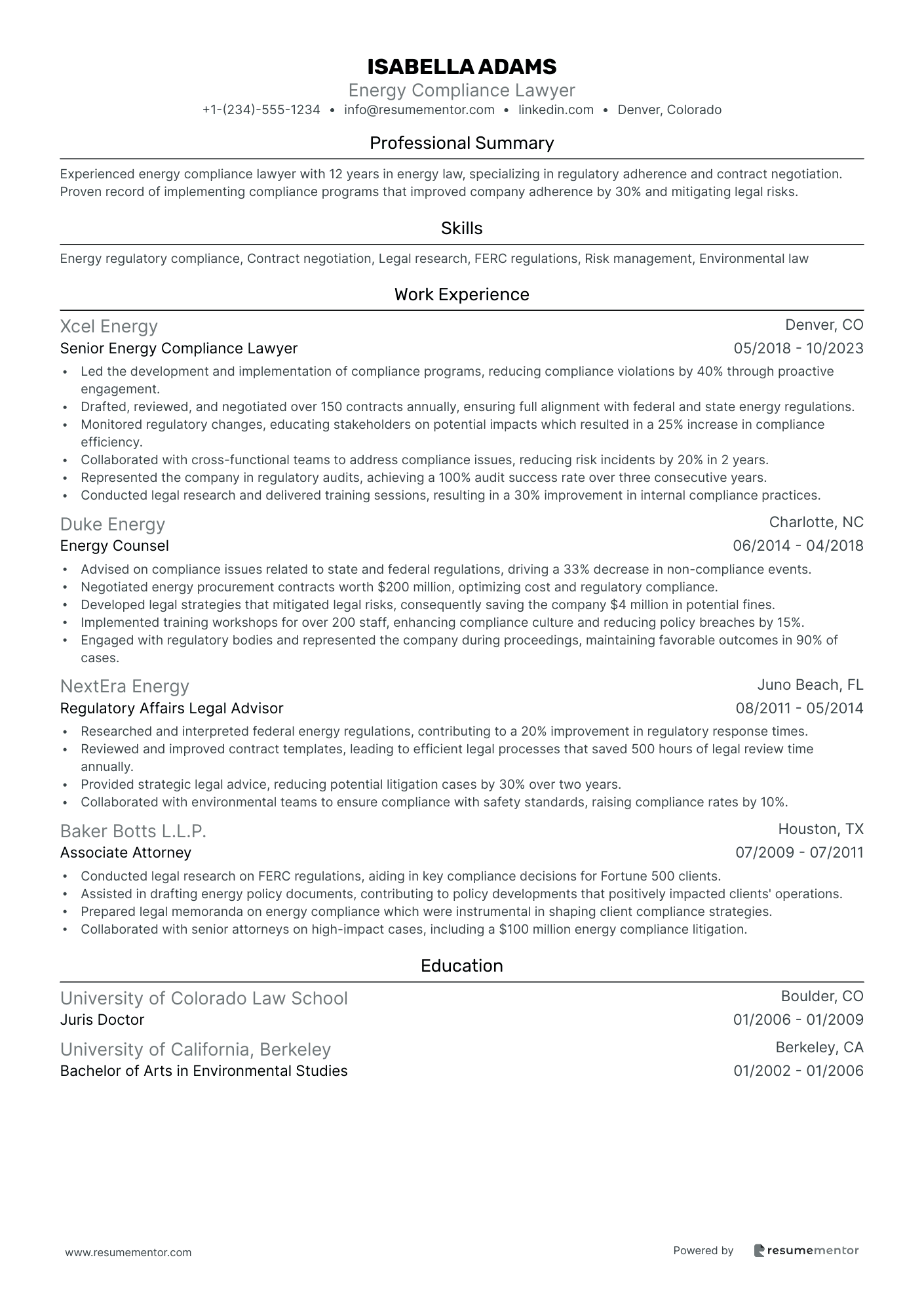
Energy Compliance Lawyer
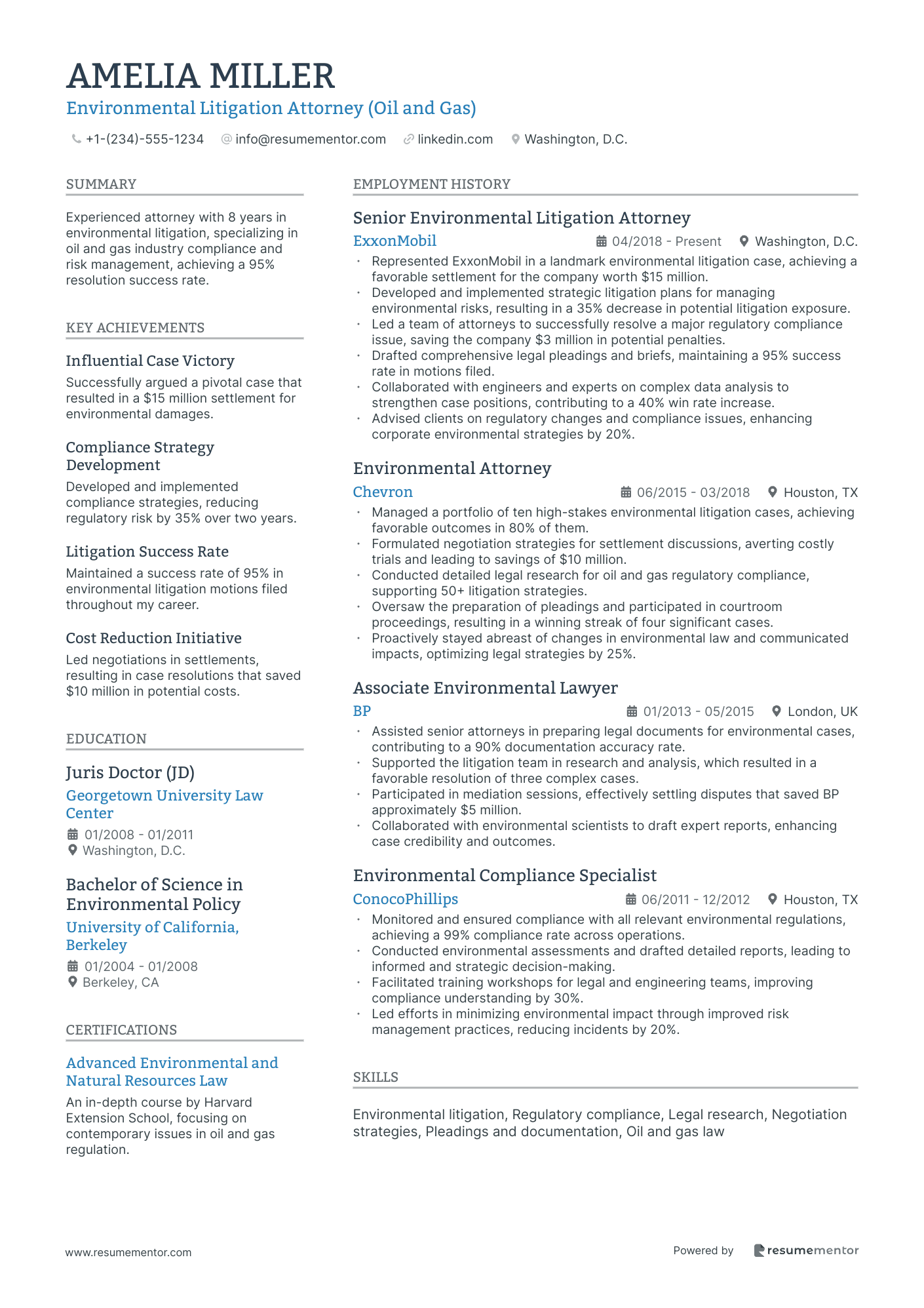
Environmental Litigation Attorney (Oil and Gas)
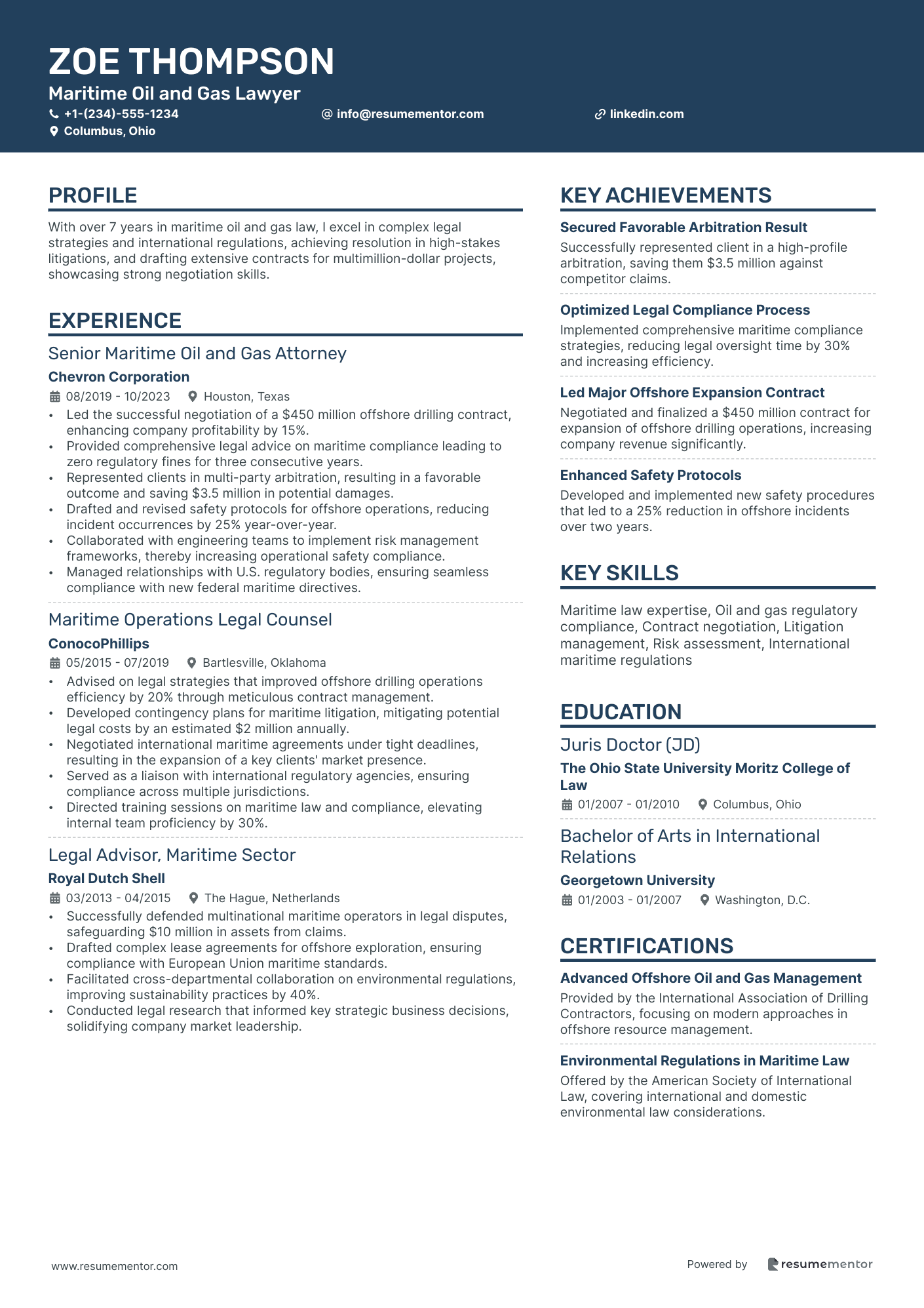
Maritime Oil and Gas Lawyer
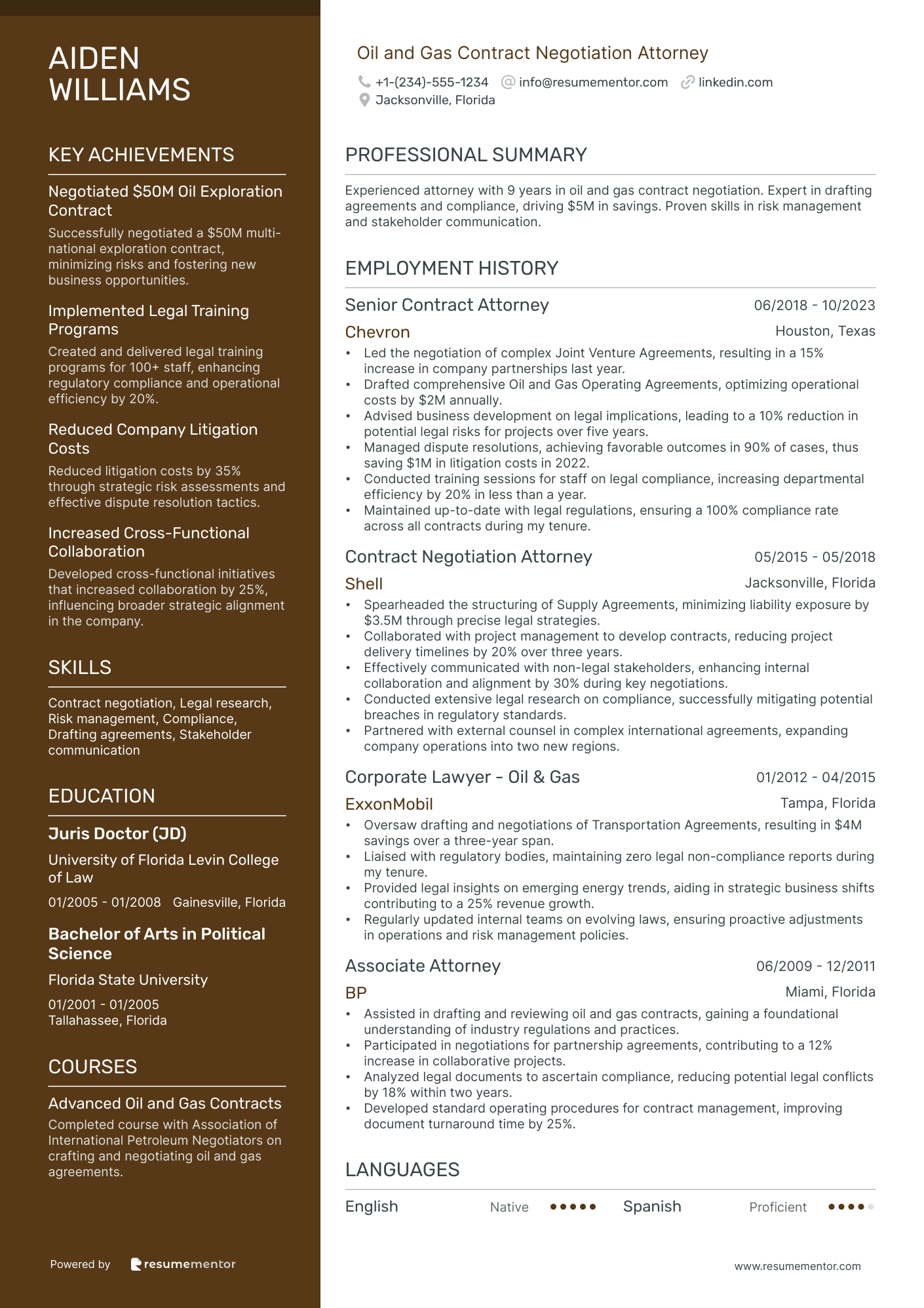
Oil and Gas Contract Negotiation Attorney
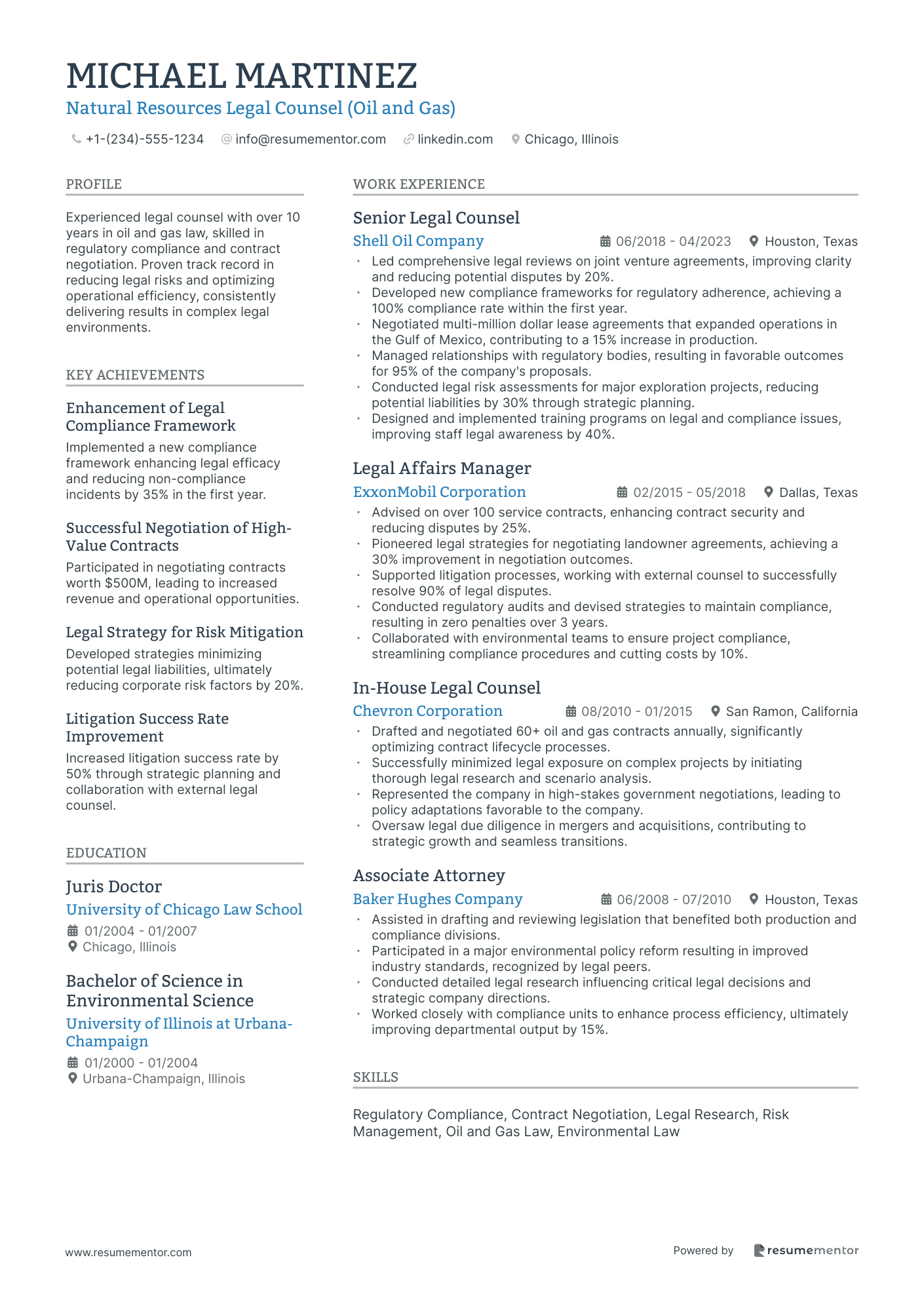
Natural Resources Legal Counsel (Oil and Gas)
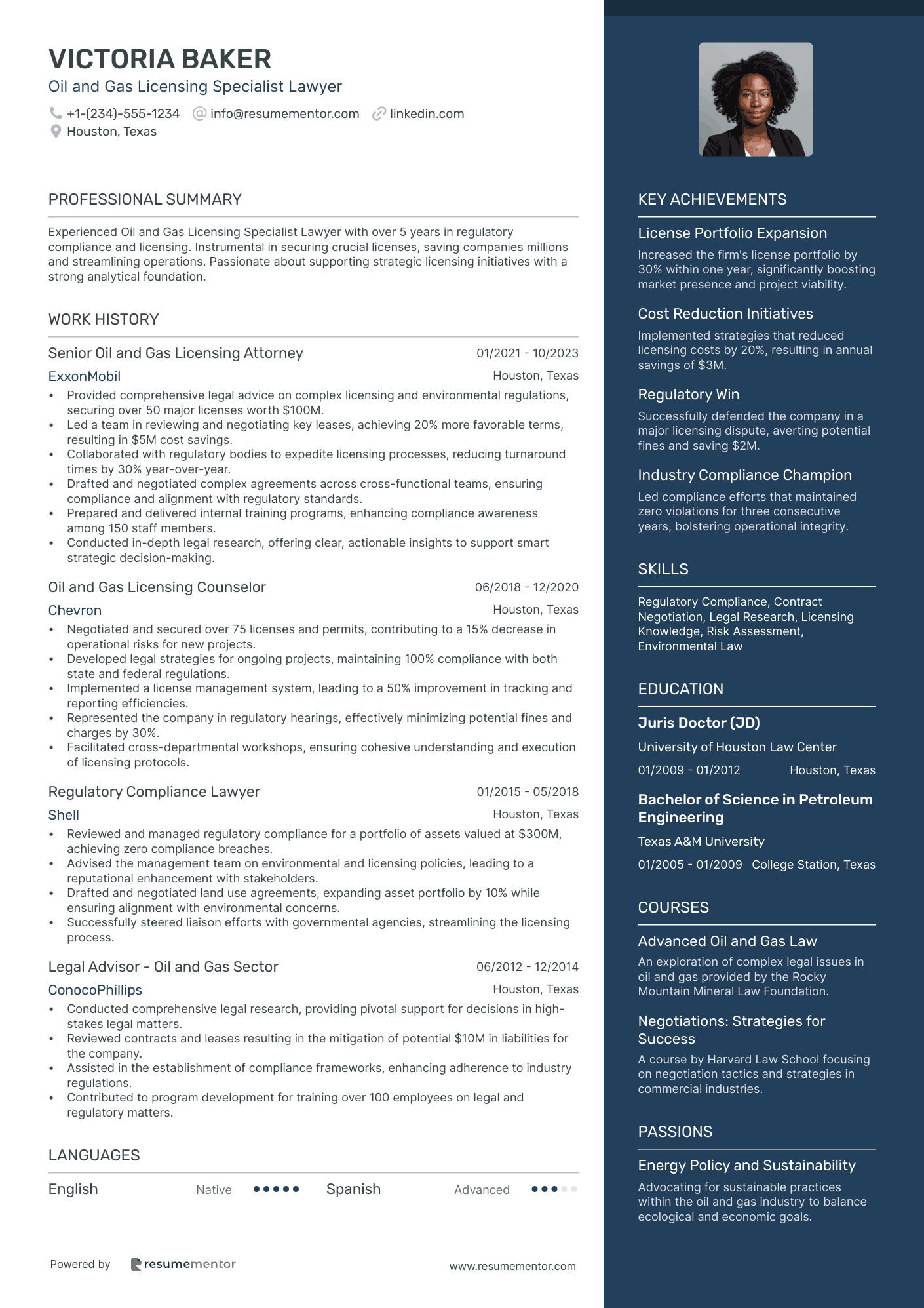
Oil and Gas Licensing Specialist Lawyer
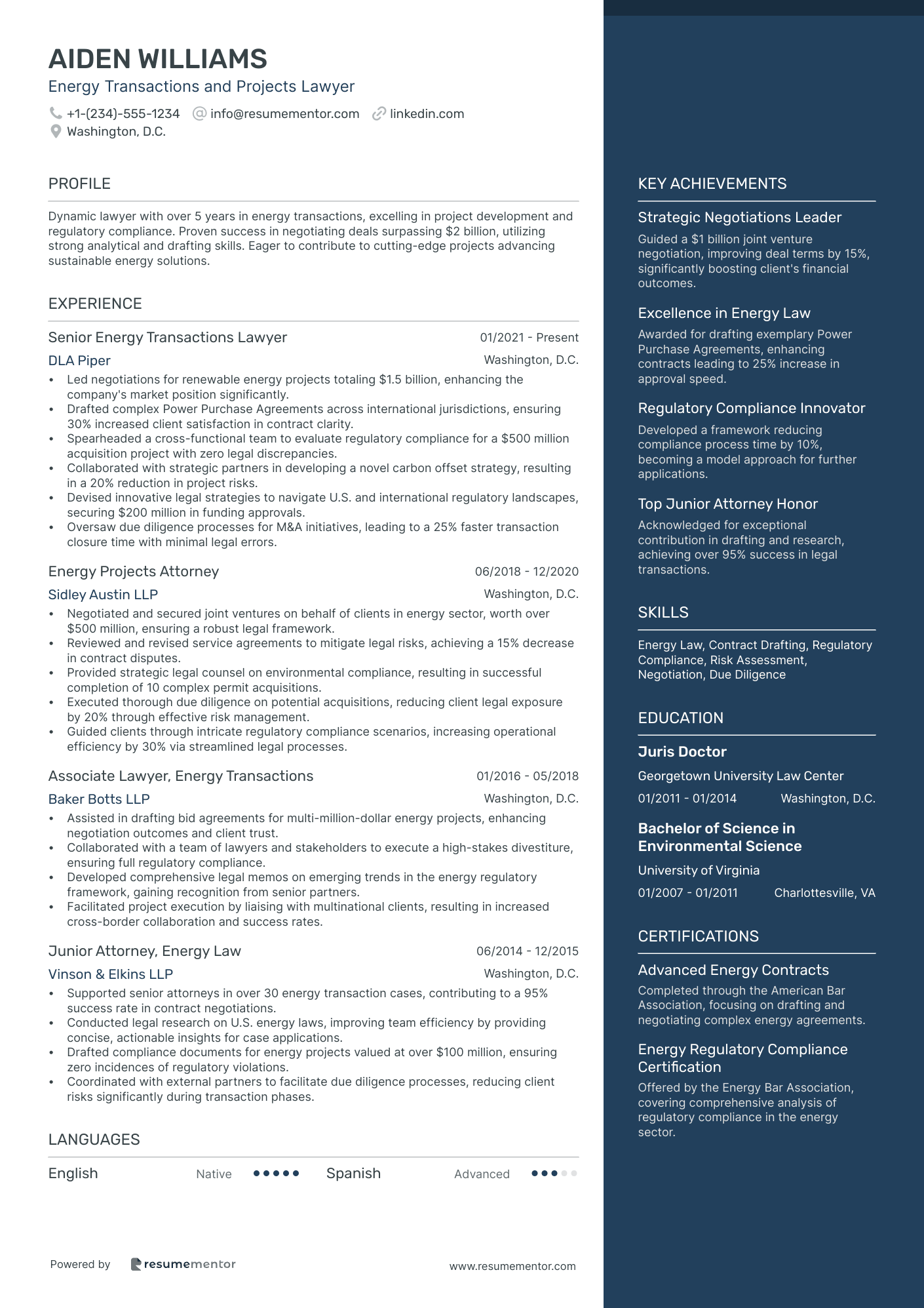
Energy Transactions and Projects Lawyer
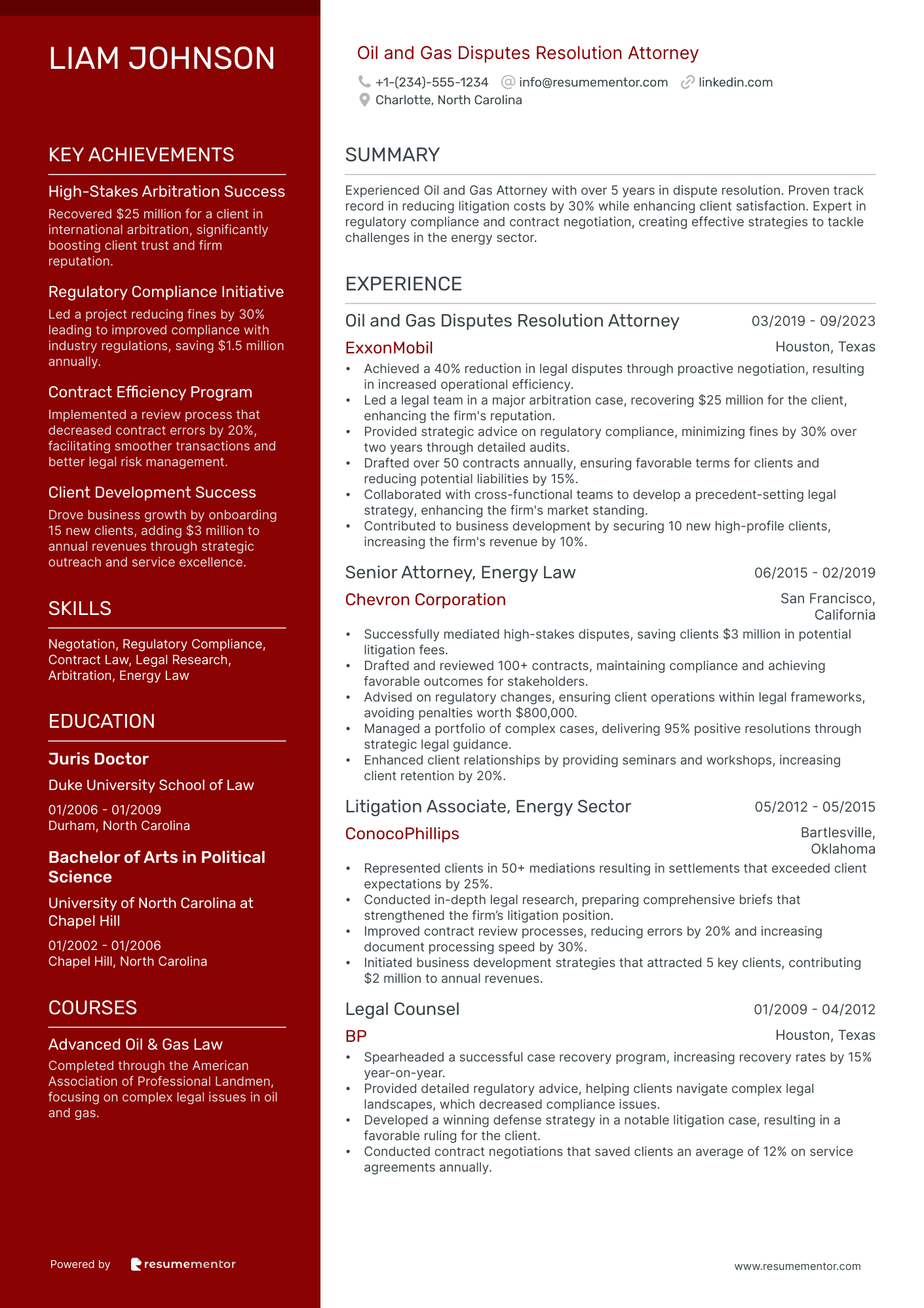
Oil and Gas Disputes Resolution Attorney
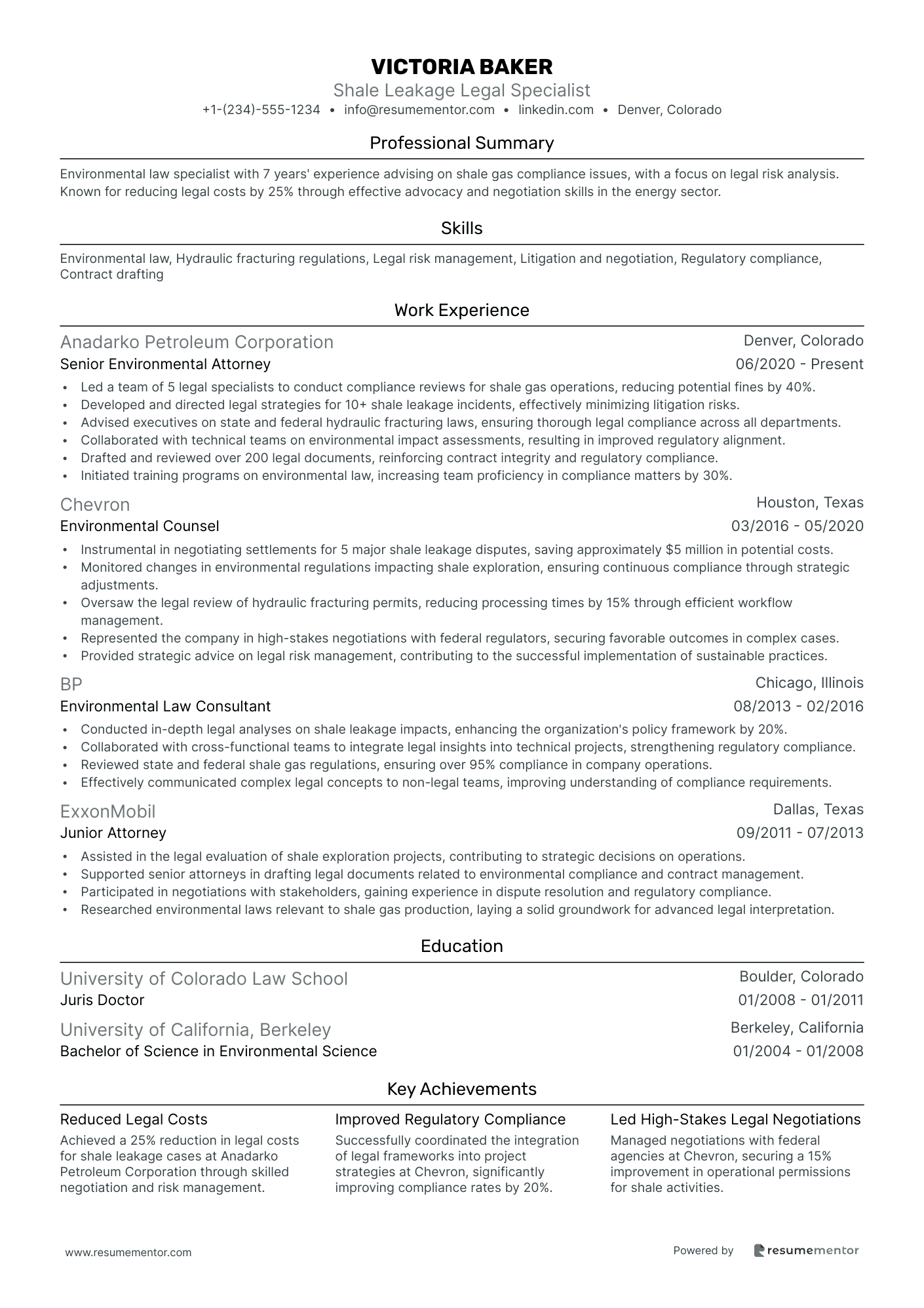
Shale Leakage Legal Specialist
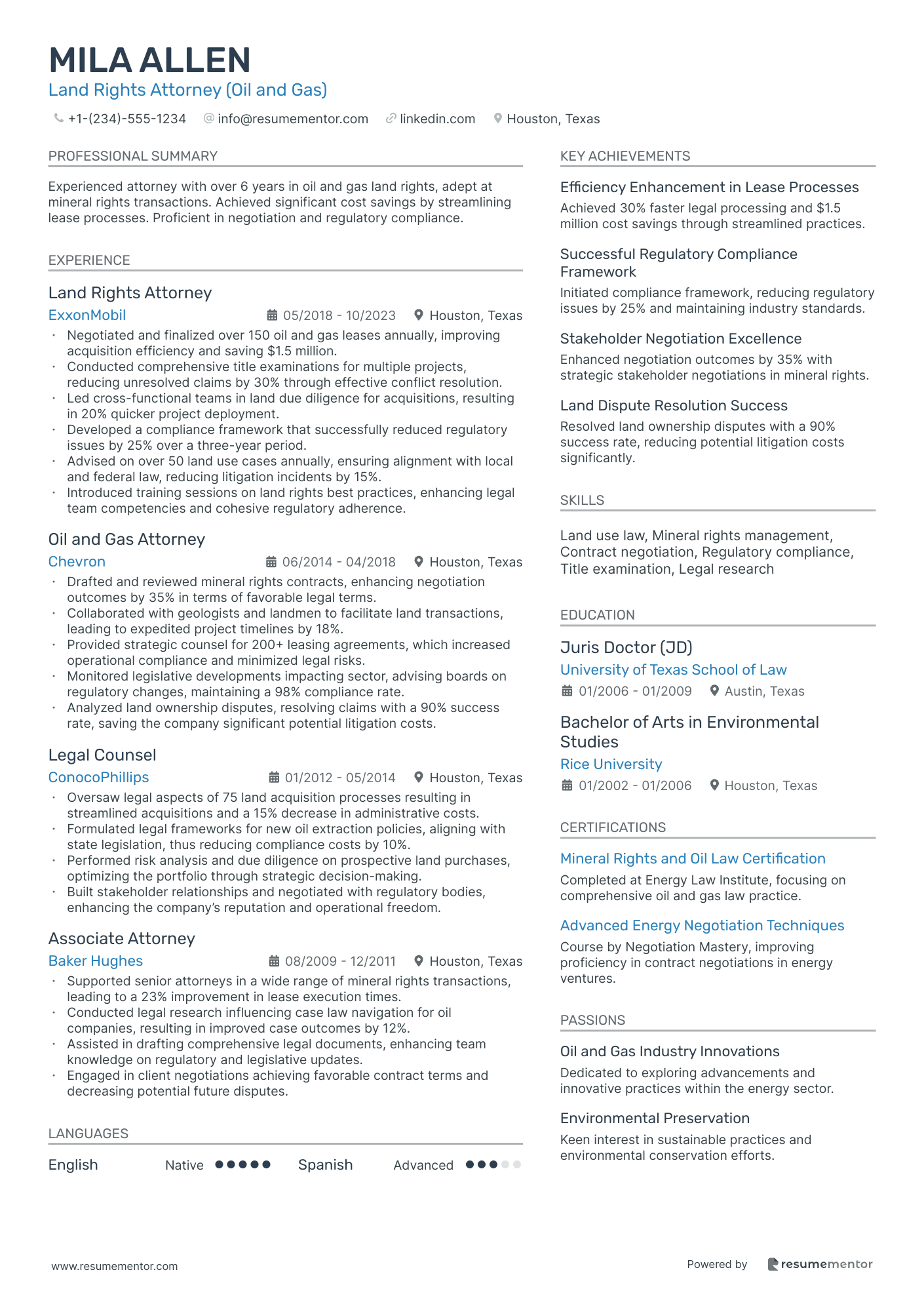
Land Rights Attorney (Oil and Gas)

Energy Compliance Lawyer resume sample
- •Led the development and implementation of compliance programs, reducing compliance violations by 40% through proactive engagement.
- •Drafted, reviewed, and negotiated over 150 contracts annually, ensuring full alignment with federal and state energy regulations.
- •Monitored regulatory changes, educating stakeholders on potential impacts which resulted in a 25% increase in compliance efficiency.
- •Collaborated with cross-functional teams to address compliance issues, reducing risk incidents by 20% in 2 years.
- •Represented the company in regulatory audits, achieving a 100% audit success rate over three consecutive years.
- •Conducted legal research and delivered training sessions, resulting in a 30% improvement in internal compliance practices.
- •Advised on compliance issues related to state and federal regulations, driving a 33% decrease in non-compliance events.
- •Negotiated energy procurement contracts worth $200 million, optimizing cost and regulatory compliance.
- •Developed legal strategies that mitigated legal risks, consequently saving the company $4 million in potential fines.
- •Implemented training workshops for over 200 staff, enhancing compliance culture and reducing policy breaches by 15%.
- •Engaged with regulatory bodies and represented the company during proceedings, maintaining favorable outcomes in 90% of cases.
- •Researched and interpreted federal energy regulations, contributing to a 20% improvement in regulatory response times.
- •Reviewed and improved contract templates, leading to efficient legal processes that saved 500 hours of legal review time annually.
- •Provided strategic legal advice, reducing potential litigation cases by 30% over two years.
- •Collaborated with environmental teams to ensure compliance with safety standards, raising compliance rates by 10%.
- •Conducted legal research on FERC regulations, aiding in key compliance decisions for Fortune 500 clients.
- •Assisted in drafting energy policy documents, contributing to policy developments that positively impacted clients' operations.
- •Prepared legal memoranda on energy compliance which were instrumental in shaping client compliance strategies.
- •Collaborated with senior attorneys on high-impact cases, including a $100 million energy compliance litigation.
Environmental Litigation Attorney (Oil and Gas) resume sample
- •Represented ExxonMobil in a landmark environmental litigation case, achieving a favorable settlement for the company worth $15 million.
- •Developed and implemented strategic litigation plans for managing environmental risks, resulting in a 35% decrease in potential litigation exposure.
- •Led a team of attorneys to successfully resolve a major regulatory compliance issue, saving the company $3 million in potential penalties.
- •Drafted comprehensive legal pleadings and briefs, maintaining a 95% success rate in motions filed.
- •Collaborated with engineers and experts on complex data analysis to strengthen case positions, contributing to a 40% win rate increase.
- •Advised clients on regulatory changes and compliance issues, enhancing corporate environmental strategies by 20%.
- •Managed a portfolio of ten high-stakes environmental litigation cases, achieving favorable outcomes in 80% of them.
- •Formulated negotiation strategies for settlement discussions, averting costly trials and leading to savings of $10 million.
- •Conducted detailed legal research for oil and gas regulatory compliance, supporting 50+ litigation strategies.
- •Oversaw the preparation of pleadings and participated in courtroom proceedings, resulting in a winning streak of four significant cases.
- •Proactively stayed abreast of changes in environmental law and communicated impacts, optimizing legal strategies by 25%.
- •Assisted senior attorneys in preparing legal documents for environmental cases, contributing to a 90% documentation accuracy rate.
- •Supported the litigation team in research and analysis, which resulted in a favorable resolution of three complex cases.
- •Participated in mediation sessions, effectively settling disputes that saved BP approximately $5 million.
- •Collaborated with environmental scientists to draft expert reports, enhancing case credibility and outcomes.
- •Monitored and ensured compliance with all relevant environmental regulations, achieving a 99% compliance rate across operations.
- •Conducted environmental assessments and drafted detailed reports, leading to informed and strategic decision-making.
- •Facilitated training workshops for legal and engineering teams, improving compliance understanding by 30%.
- •Led efforts in minimizing environmental impact through improved risk management practices, reducing incidents by 20%.
Maritime Oil and Gas Lawyer resume sample
- •Led the successful negotiation of a $450 million offshore drilling contract, enhancing company profitability by 15%.
- •Provided comprehensive legal advice on maritime compliance leading to zero regulatory fines for three consecutive years.
- •Represented clients in multi-party arbitration, resulting in a favorable outcome and saving $3.5 million in potential damages.
- •Drafted and revised safety protocols for offshore operations, reducing incident occurrences by 25% year-over-year.
- •Collaborated with engineering teams to implement risk management frameworks, thereby increasing operational safety compliance.
- •Managed relationships with U.S. regulatory bodies, ensuring seamless compliance with new federal maritime directives.
- •Advised on legal strategies that improved offshore drilling operations efficiency by 20% through meticulous contract management.
- •Developed contingency plans for maritime litigation, mitigating potential legal costs by an estimated $2 million annually.
- •Negotiated international maritime agreements under tight deadlines, resulting in the expansion of a key clients' market presence.
- •Served as a liaison with international regulatory agencies, ensuring compliance across multiple jurisdictions.
- •Directed training sessions on maritime law and compliance, elevating internal team proficiency by 30%.
- •Successfully defended multinational maritime operators in legal disputes, safeguarding $10 million in assets from claims.
- •Drafted complex lease agreements for offshore exploration, ensuring compliance with European Union maritime standards.
- •Facilitated cross-departmental collaboration on environmental regulations, improving sustainability practices by 40%.
- •Conducted legal research that informed key strategic business decisions, solidifying company market leadership.
- •Assisted in litigation proceedings, contributing to favorable court outcomes in 90% of maritime-related cases.
- •Reviewed and advised on shipping contracts, saving clients over $500,000 in avoided legal disputes annually.
- •Drafted legal memoranda that supported effective decision-making within the maritime oil and gas sectors.
- •Compiled complex legal documentation, enhancing the efficiency of case handling procedures by 25%.
Oil and Gas Contract Negotiation Attorney resume sample
- •Led the negotiation of complex Joint Venture Agreements, resulting in a 15% increase in company partnerships last year.
- •Drafted comprehensive Oil and Gas Operating Agreements, optimizing operational costs by $2M annually.
- •Advised business development on legal implications, leading to a 10% reduction in potential legal risks for projects over five years.
- •Managed dispute resolutions, achieving favorable outcomes in 90% of cases, thus saving $1M in litigation costs in 2022.
- •Conducted training sessions for staff on legal compliance, increasing departmental efficiency by 20% in less than a year.
- •Maintained up-to-date with legal regulations, ensuring a 100% compliance rate across all contracts during my tenure.
- •Spearheaded the structuring of Supply Agreements, minimizing liability exposure by $3.5M through precise legal strategies.
- •Collaborated with project management to develop contracts, reducing project delivery timelines by 20% over three years.
- •Effectively communicated with non-legal stakeholders, enhancing internal collaboration and alignment by 30% during key negotiations.
- •Conducted extensive legal research on compliance, successfully mitigating potential breaches in regulatory standards.
- •Partnered with external counsel in complex international agreements, expanding company operations into two new regions.
- •Oversaw drafting and negotiations of Transportation Agreements, resulting in $4M savings over a three-year span.
- •Liaised with regulatory bodies, maintaining zero legal non-compliance reports during my tenure.
- •Provided legal insights on emerging energy trends, aiding in strategic business shifts contributing to a 25% revenue growth.
- •Regularly updated internal teams on evolving laws, ensuring proactive adjustments in operations and risk management policies.
- •Assisted in drafting and reviewing oil and gas contracts, gaining a foundational understanding of industry regulations and practices.
- •Participated in negotiations for partnership agreements, contributing to a 12% increase in collaborative projects.
- •Analyzed legal documents to ascertain compliance, reducing potential legal conflicts by 18% within two years.
- •Developed standard operating procedures for contract management, improving document turnaround time by 25%.
Natural Resources Legal Counsel (Oil and Gas) resume sample
- •Led comprehensive legal reviews on joint venture agreements, improving clarity and reducing potential disputes by 20%.
- •Developed new compliance frameworks for regulatory adherence, achieving a 100% compliance rate within the first year.
- •Negotiated multi-million dollar lease agreements that expanded operations in the Gulf of Mexico, contributing to a 15% increase in production.
- •Managed relationships with regulatory bodies, resulting in favorable outcomes for 95% of the company's proposals.
- •Conducted legal risk assessments for major exploration projects, reducing potential liabilities by 30% through strategic planning.
- •Designed and implemented training programs on legal and compliance issues, improving staff legal awareness by 40%.
- •Advised on over 100 service contracts, enhancing contract security and reducing disputes by 25%.
- •Pioneered legal strategies for negotiating landowner agreements, achieving a 30% improvement in negotiation outcomes.
- •Supported litigation processes, working with external counsel to successfully resolve 90% of legal disputes.
- •Conducted regulatory audits and devised strategies to maintain compliance, resulting in zero penalties over 3 years.
- •Collaborated with environmental teams to ensure project compliance, streamlining compliance procedures and cutting costs by 10%.
- •Drafted and negotiated 60+ oil and gas contracts annually, significantly optimizing contract lifecycle processes.
- •Successfully minimized legal exposure on complex projects by initiating thorough legal research and scenario analysis.
- •Represented the company in high-stakes government negotiations, leading to policy adaptations favorable to the company.
- •Oversaw legal due diligence in mergers and acquisitions, contributing to strategic growth and seamless transitions.
- •Assisted in drafting and reviewing legislation that benefited both production and compliance divisions.
- •Participated in a major environmental policy reform resulting in improved industry standards, recognized by legal peers.
- •Conducted detailed legal research influencing critical legal decisions and strategic company directions.
- •Worked closely with compliance units to enhance process efficiency, ultimately improving departmental output by 15%.
Oil and Gas Licensing Specialist Lawyer resume sample
- •Provided comprehensive legal advice on complex licensing and environmental regulations, securing over 50 major licenses worth $100M.
- •Led a team in reviewing and negotiating key leases, achieving 20% more favorable terms, resulting in $5M cost savings.
- •Collaborated with regulatory bodies to expedite licensing processes, reducing turnaround times by 30% year-over-year.
- •Drafted and negotiated complex agreements across cross-functional teams, ensuring compliance and alignment with regulatory standards.
- •Prepared and delivered internal training programs, enhancing compliance awareness among 150 staff members.
- •Conducted in-depth legal research, offering clear, actionable insights to support smart strategic decision-making.
- •Negotiated and secured over 75 licenses and permits, contributing to a 15% decrease in operational risks for new projects.
- •Developed legal strategies for ongoing projects, maintaining 100% compliance with both state and federal regulations.
- •Implemented a license management system, leading to a 50% improvement in tracking and reporting efficiencies.
- •Represented the company in regulatory hearings, effectively minimizing potential fines and charges by 30%.
- •Facilitated cross-departmental workshops, ensuring cohesive understanding and execution of licensing protocols.
- •Reviewed and managed regulatory compliance for a portfolio of assets valued at $300M, achieving zero compliance breaches.
- •Advised the management team on environmental and licensing policies, leading to a reputational enhancement with stakeholders.
- •Drafted and negotiated land use agreements, expanding asset portfolio by 10% while ensuring alignment with environmental concerns.
- •Successfully steered liaison efforts with governmental agencies, streamlining the licensing process.
- •Conducted comprehensive legal research, providing pivotal support for decisions in high-stakes legal matters.
- •Reviewed contracts and leases resulting in the mitigation of potential $10M in liabilities for the company.
- •Assisted in the establishment of compliance frameworks, enhancing adherence to industry regulations.
- •Contributed to program development for training over 100 employees on legal and regulatory matters.
Energy Transactions and Projects Lawyer resume sample
- •Led negotiations for renewable energy projects totaling $1.5 billion, enhancing the company's market position significantly.
- •Drafted complex Power Purchase Agreements across international jurisdictions, ensuring 30% increased client satisfaction in contract clarity.
- •Spearheaded a cross-functional team to evaluate regulatory compliance for a $500 million acquisition project with zero legal discrepancies.
- •Collaborated with strategic partners in developing a novel carbon offset strategy, resulting in a 20% reduction in project risks.
- •Devised innovative legal strategies to navigate U.S. and international regulatory landscapes, securing $200 million in funding approvals.
- •Oversaw due diligence processes for M&A initiatives, leading to a 25% faster transaction closure time with minimal legal errors.
- •Negotiated and secured joint ventures on behalf of clients in energy sector, worth over $500 million, ensuring a robust legal framework.
- •Reviewed and revised service agreements to mitigate legal risks, achieving a 15% decrease in contract disputes.
- •Provided strategic legal counsel on environmental compliance, resulting in successful completion of 10 complex permit acquisitions.
- •Executed thorough due diligence on potential acquisitions, reducing client legal exposure by 20% through effective risk management.
- •Guided clients through intricate regulatory compliance scenarios, increasing operational efficiency by 30% via streamlined legal processes.
- •Assisted in drafting bid agreements for multi-million-dollar energy projects, enhancing negotiation outcomes and client trust.
- •Collaborated with a team of lawyers and stakeholders to execute a high-stakes divestiture, ensuring full regulatory compliance.
- •Developed comprehensive legal memos on emerging trends in the energy regulatory framework, gaining recognition from senior partners.
- •Facilitated project execution by liaising with multinational clients, resulting in increased cross-border collaboration and success rates.
- •Supported senior attorneys in over 30 energy transaction cases, contributing to a 95% success rate in contract negotiations.
- •Conducted legal research on U.S. energy laws, improving team efficiency by providing concise, actionable insights for case applications.
- •Drafted compliance documents for energy projects valued at over $100 million, ensuring zero incidences of regulatory violations.
- •Coordinated with external partners to facilitate due diligence processes, reducing client risks significantly during transaction phases.
Oil and Gas Disputes Resolution Attorney resume sample
- •Achieved a 40% reduction in legal disputes through proactive negotiation, resulting in increased operational efficiency.
- •Led a legal team in a major arbitration case, recovering $25 million for the client, enhancing the firm's reputation.
- •Provided strategic advice on regulatory compliance, minimizing fines by 30% over two years through detailed audits.
- •Drafted over 50 contracts annually, ensuring favorable terms for clients and reducing potential liabilities by 15%.
- •Collaborated with cross-functional teams to develop a precedent-setting legal strategy, enhancing the firm's market standing.
- •Contributed to business development by securing 10 new high-profile clients, increasing the firm's revenue by 10%.
- •Successfully mediated high-stakes disputes, saving clients $3 million in potential litigation fees.
- •Drafted and reviewed 100+ contracts, maintaining compliance and achieving favorable outcomes for stakeholders.
- •Advised on regulatory changes, ensuring client operations within legal frameworks, avoiding penalties worth $800,000.
- •Managed a portfolio of complex cases, delivering 95% positive resolutions through strategic legal guidance.
- •Enhanced client relationships by providing seminars and workshops, increasing client retention by 20%.
- •Represented clients in 50+ mediations resulting in settlements that exceeded client expectations by 25%.
- •Conducted in-depth legal research, preparing comprehensive briefs that strengthened the firm’s litigation position.
- •Improved contract review processes, reducing errors by 20% and increasing document processing speed by 30%.
- •Initiated business development strategies that attracted 5 key clients, contributing $2 million to annual revenues.
- •Spearheaded a successful case recovery program, increasing recovery rates by 15% year-on-year.
- •Provided detailed regulatory advice, helping clients navigate complex legal landscapes, which decreased compliance issues.
- •Developed a winning defense strategy in a notable litigation case, resulting in a favorable ruling for the client.
- •Conducted contract negotiations that saved clients an average of 12% on service agreements annually.
Shale Leakage Legal Specialist resume sample
- •Led a team of 5 legal specialists to conduct compliance reviews for shale gas operations, reducing potential fines by 40%.
- •Developed and directed legal strategies for 10+ shale leakage incidents, effectively minimizing litigation risks.
- •Advised executives on state and federal hydraulic fracturing laws, ensuring thorough legal compliance across all departments.
- •Collaborated with technical teams on environmental impact assessments, resulting in improved regulatory alignment.
- •Drafted and reviewed over 200 legal documents, reinforcing contract integrity and regulatory compliance.
- •Initiated training programs on environmental law, increasing team proficiency in compliance matters by 30%.
- •Instrumental in negotiating settlements for 5 major shale leakage disputes, saving approximately $5 million in potential costs.
- •Monitored changes in environmental regulations impacting shale exploration, ensuring continuous compliance through strategic adjustments.
- •Oversaw the legal review of hydraulic fracturing permits, reducing processing times by 15% through efficient workflow management.
- •Represented the company in high-stakes negotiations with federal regulators, securing favorable outcomes in complex cases.
- •Provided strategic advice on legal risk management, contributing to the successful implementation of sustainable practices.
- •Conducted in-depth legal analyses on shale leakage impacts, enhancing the organization's policy framework by 20%.
- •Collaborated with cross-functional teams to integrate legal insights into technical projects, strengthening regulatory compliance.
- •Reviewed state and federal shale gas regulations, ensuring over 95% compliance in company operations.
- •Effectively communicated complex legal concepts to non-legal teams, improving understanding of compliance requirements.
- •Assisted in the legal evaluation of shale exploration projects, contributing to strategic decisions on operations.
- •Supported senior attorneys in drafting legal documents related to environmental compliance and contract management.
- •Participated in negotiations with stakeholders, gaining experience in dispute resolution and regulatory compliance.
- •Researched environmental laws relevant to shale gas production, laying a solid groundwork for advanced legal interpretation.
Land Rights Attorney (Oil and Gas) resume sample
- •Negotiated and finalized over 150 oil and gas leases annually, improving acquisition efficiency and saving $1.5 million.
- •Conducted comprehensive title examinations for multiple projects, reducing unresolved claims by 30% through effective conflict resolution.
- •Led cross-functional teams in land due diligence for acquisitions, resulting in 20% quicker project deployment.
- •Developed a compliance framework that successfully reduced regulatory issues by 25% over a three-year period.
- •Advised on over 50 land use cases annually, ensuring alignment with local and federal law, reducing litigation incidents by 15%.
- •Introduced training sessions on land rights best practices, enhancing legal team competencies and cohesive regulatory adherence.
- •Drafted and reviewed mineral rights contracts, enhancing negotiation outcomes by 35% in terms of favorable legal terms.
- •Collaborated with geologists and landmen to facilitate land transactions, leading to expedited project timelines by 18%.
- •Provided strategic counsel for 200+ leasing agreements, which increased operational compliance and minimized legal risks.
- •Monitored legislative developments impacting sector, advising boards on regulatory changes, maintaining a 98% compliance rate.
- •Analyzed land ownership disputes, resolving claims with a 90% success rate, saving the company significant potential litigation costs.
- •Oversaw legal aspects of 75 land acquisition processes resulting in streamlined acquisitions and a 15% decrease in administrative costs.
- •Formulated legal frameworks for new oil extraction policies, aligning with state legislation, thus reducing compliance costs by 10%.
- •Performed risk analysis and due diligence on prospective land purchases, optimizing the portfolio through strategic decision-making.
- •Built stakeholder relationships and negotiated with regulatory bodies, enhancing the company’s reputation and operational freedom.
- •Supported senior attorneys in a wide range of mineral rights transactions, leading to a 23% improvement in lease execution times.
- •Conducted legal research influencing case law navigation for oil companies, resulting in improved case outcomes by 12%.
- •Assisted in drafting comprehensive legal documents, enhancing team knowledge on regulatory and legislative updates.
- •Engaged in client negotiations achieving favorable contract terms and decreasing potential future disputes.
Crafting a compelling oil and gas attorney resume can feel like navigating a complex pipeline, where every detail needs precision. Your resume is a vital tool for expressing your unique blend of legal expertise and industry-specific knowledge, which are the keys to unlocking new opportunities. It helps potential employers see how your skills can drive their organization's success, making it essential to articulate your value clearly.
In this competitive market, many attorneys find it challenging to present their specialized skills effectively. Precision is crucial, and that's why using a well-structured resume template, like those found at Resume Mentor, can be a game-changer. A structured approach ensures your qualifications and achievements catch the eye of hiring managers, who often have limited time to review applications.
As an oil and gas attorney, it's important to highlight your extensive regulatory experience alongside your ability to handle complex contracts. Demonstrating your skill in negotiating deals and resolving disputes effectively adds another layer to your professional profile, showing employers you have what it takes to succeed.
Avoid common pitfalls like undervaluing your expertise in energy regulations or overlooking your contributions to previous projects. Your resume should demonstrate the same tact and authority you bring to legal negotiations, ensuring every word counts.
In a highly specialized field, the first impression your resume makes can determine your chances for an interview. With the right tools and guidance, you can create a resume that not only meets industry expectations but also propels your career forward with confidence.
Key Takeaways
- Crafting a compelling oil and gas attorney resume involves clearly articulating your legal expertise and industry-specific knowledge to potential employers.
- Using a well-structured resume template can help highlight your skills and achievements effectively to catch the eye of hiring managers quickly.
- Highlight your extensive regulatory experience, ability to handle complex contracts, and skill in negotiating deals and resolving disputes.
- Avoid common pitfalls like undervaluing your expertise and ensure your resume reflects the authority and tact you bring to legal negotiations.
- Choosing the right sections like contact details, professional summary, work experience, and skills is crucial for effectively presenting your profile.
What to focus on when writing your oil and gas attorney resume
An oil and gas attorney resume should clearly communicate your legal expertise in the energy sector, highlighting your strengths in contract negotiation and regulatory compliance. This approach allows recruiters to quickly recognize your value and how well you might fit within their organization.
How to structure your oil and gas attorney resume
- Contact Information: Start with clear and accessible contact details—your name, phone number, email, and LinkedIn profile—so employers can easily reach you. Make sure these are updated and professional; this is your first point of contact, setting the tone for your application.
- Professional Summary: Next, provide a snapshot of your career in oil and gas law, emphasizing your insight into industry-specific regulations and how this expertise benefits your legal practice. Use this space to frame your experience in a way that aligns with the job description, drawing connections between your skills and the employer's needs.
- Work Experience: Build on this by detailing your previous roles, where you managed responsibilities like drafting oil and gas contracts, navigating complex environmental laws, and handling land and property rights issues. Highlight projects that had significant impacts, whether it was cost savings, risk mitigation, or enhancing legal strategies.
- Education: Support your experience with a strong educational background by mentioning your law degree and relevant certifications, focusing on courses or training specific to energy law that have enhanced your practice. Demonstrating an educational path that complements your practical experiences reinforces your qualifications to potential employers.
- Skills: Highlight critical abilities that set you apart, such as your knowledge of federal and state energy regulations, your prowess in contract negotiation, and your litigation experience. Showcase your well-rounded legal acumen by including both technical skills and soft skills like negotiation and communication, essential for effective legal practice in this field.
- Professional Affiliations: Further demonstrate your industry engagement by listing memberships in relevant associations, like the American Bar Association's Section of Environment, Energy, and Resources. This reflects your commitment to staying informed and involved, indicating a proactive approach to continuous learning and professional development.
Optional sections like certifications, volunteer work, or conferences and seminars attended add depth by showing your ongoing dedication to professional growth and industry involvement. As we delve deeper into each resume section below, we'll explore how to craft a more impactful and targeted resume for your role as an oil and gas attorney.
Which resume format to choose
Crafting a standout resume as an oil and gas attorney involves weaving together several key elements to present your experience effectively. Start with the format. A reverse-chronological layout showcases your career trajectory by placing your most recent roles and accomplishments front and center. This approach aligns with the expectations of employers in the oil and gas industry, who value seeing your latest professional contributions and advancements.
When it comes to font selection, choosing modern options like Rubik, Lato, or Montserrat can subtly enhance the visual appeal of your resume. These fonts help convey professionalism and ensure your document is easy to read, setting it apart from the more commonly used Arial or Times New Roman. This choice reflects a current and polished image, which is crucial in a detail-oriented field like oil and gas law.
Saving your resume as a PDF is a small but significant step. PDFs lock in your formatting, ensuring that your document appears consistently across all devices. This consistency is a reflection of your attention to detail, a critical trait for anyone practicing law, where precision and reliability are paramount.
Lastly, setting your margins between 0.5 and 1 inch provides the document with necessary white space, creating a clean, uncluttered look. This thoughtful presentation makes your resume easier to navigate, inviting hiring managers to focus on your qualifications and expertise without distraction.
By integrating these elements, your resume will not only reflect your skills and experience but also demonstrate the clarity and professionalism that is essential in the oil and gas legal sector.
How to write a quantifiable resume experience section
The experience section of your resume as an oil and gas attorney is vital to showcasing your professional impact and achievements. This section allows employers to see not just what you’ve done but how you’ve contributed to your field. Focus on specific accomplishments and use action verbs combined with quantifiable results to paint a vivid picture of your capabilities. Start with your most recent role and work backward 10 to 15 years, prioritizing roles that are highly relevant to the position you’re targeting. Tailor each bullet point to match the skills and results highlighted in the job ad, ensuring you include relevant job titles and use strong action words like "negotiated," "advised," "streamlined," and "spearheaded."
Here's an example:
- •Negotiated over $500 million in contracts, achieving 15% cost savings for the firm.
- •Advised on complex regulatory compliance, reducing potential penalties by 40%.
- •Streamlined contract review processes, cutting review time by 30%.
- •Spearheaded a cross-functional team in a $200 million acquisition, ensuring successful integration.
This experience section effectively ties your work history to concrete results, enhancing your professional narrative. By including specific numbers, you create a clear connection between your efforts and the company’s success, making your value immediately recognizable. Each bullet point delves into the actionable outcomes of your work, linking your achievements directly to what potential employers are seeking. This method isn't just listing past jobs; it's demonstrating your proactive and results-driven nature, a key asset in the competitive legal sector.
Growth-Focused resume experience section
A growth-focused oil and gas attorney resume experience section should clearly demonstrate how your legal expertise enhances the company's success. Begin by identifying key achievements and responsibilities that highlight your impact on business growth. Illustrate accomplishments like winning major legal battles, negotiating essential contracts, and streamlining regulatory compliance processes. These achievements should clearly communicate your ability to drive results and contribute to the company's objectives.
When organizing your bullet points, reflect a progression of responsibilities and measurable outcomes. Link specific actions to tangible business improvements, such as streamlining legal procedures or expanding partnerships, to show a direct correlation between your work and the company's growth. Tailor your language to emphasize how your experience aligns with the company’s goals, reinforcing your role as a valuable asset. The objective is to convey how your legal skills not only protect the company's interests but also play a crucial role in driving its growth and success.
Senior Oil and Gas Attorney
Energy Solutions Inc.
January 2015 - Present
- Led legal negotiations on a $50 million contract, boosting company revenue significantly.
- Crafted compliance strategies that slashed regulatory risks by 30%, enhancing operational security.
- Advised on strategic mergers and acquisitions, expanding the company's market share by 15%.
- Established a streamlined legal framework that improved contract turnaround time by 20%.
Skills-Focused resume experience section
A skills-focused oil and gas attorney resume experience section should clearly highlight the specific abilities and achievements that are crucial in the industry. Begin by showcasing your expertise in energy law and demonstrating how you've used these skills to tackle real-world challenges. Employ strong action verbs to vividly illustrate your role and contributions, ensuring clarity for the reader. Your ability to handle complex legal issues related to contracts, compliance, and negotiations should take center stage, showing the significant value you add to any employer. It's important to be specific about your successes and how they have positively impacted your previous positions.
With the bullet points, the focus should be on tangible accomplishments and responsibilities that showcase your expertise. Provide detailed examples such as successfully negotiating high-stakes contracts, offering guidance on regulatory compliance, or securing favorable outcomes in legal disputes. Use numbers to quantify your achievements, painting a clear picture of the impact you've made. Keeping the language simple and direct ensures that anyone reading can quickly grasp the significance of your work.
Senior Oil and Gas Attorney
PetroLaw Group
June 2018 - Present
- Negotiated multi-million dollar contracts, saving clients over 10% in projected costs
- Advised companies on regulatory compliance, reducing potential fines by 20%
- Led litigation strategies in 15 cases, achieving favorable outcomes in over 80%
- Implemented strategies for lease negotiations, enhancing client portfolios by 25%
Collaboration-Focused resume experience section
A collaboration-focused oil and gas attorney resume experience section should seamlessly integrate your teamwork skills and cooperative success stories. Start by emphasizing your involvement in cross-functional teams and significant negotiations or projects you’ve led. This approach highlights your knack for effectively working with diverse groups to achieve both legal and business objectives. It’s important to include specific examples where your collaborative efforts led to beneficial outcomes for your clients or firm, thereby showcasing your direct impact.
To make your achievements stand out, use bullet points to succinctly list them, ensuring each point reflects a result or improvement driven by teamwork. Demonstrate your active participation and the skills you used to cultivate successful partnerships in the oil and gas industry. This strategy creates a compelling narrative for potential employers, illustrating your collaborative strengths and proving your capability to excel in roles that depend on effective teamwork across various departments and organizations.
Senior Attorney
Global Energy Solutions
March 2019 - Present
- Facilitated multi-party joint ventures with global oil corporations, enhancing production by 20%.
- Co-led a team of 10 attorneys to draft and negotiate contracts, ensuring regulatory compliance across state lines.
- Collaborated with environmental experts to develop sustainable extraction practices, reducing litigation risks by 30%.
- Advised on cross-border mergers, improving company efficiency and legal preparedness for future expansions.
Achievement-Focused resume experience section
An achievement-focused oil and gas attorney resume experience section should emphasize accomplishments over duties, weaving a cohesive narrative. Start by choosing a job title that clearly reflects your specific role, such as "Senior Legal Advisor," which paints a clearer picture than simply "Attorney." Using active language to describe your successes can make your experience come alive, particularly when you include quantifiable outcomes. By focusing on the impact you've made—whether through successful negotiations, significant legal victories, or key policy developments—you illustrate how you’ve used your expertise to benefit your employer.
Further, by incorporating specific examples that showcase your skills and leadership in the oil and gas sector, you highlight your ability to navigate complex transactions and regulatory challenges. This, in turn, underscores your knowledge of industry-specific regulations and your comfort in high-stakes environments. Together, these points demonstrate your ability to apply your skills effectively in real-world situations, ensuring your resume doesn’t just list jobs, but instead tells a compelling story of growth and success tailored to the unique demands of the oil and gas industry.
Oil and Gas Attorney
Global Energy Solutions
January 2020 - Present
- Led the negotiation of a $350M acquisition deal, achieving favorable terms for the client.
- Drafted and reviewed over 100 complex contracts, ensuring airtight compliance.
- Secured the dismissal of a multimillion-dollar lawsuit through strategic litigation efforts.
- Authored a comprehensive compliance manual, reducing operational risks by 20%.
Write your oil and gas attorney resume summary section
An oil and gas-focused attorney's resume summary should effectively showcase your skills and achievements with clarity. Emphasizing your knowledge of energy law, negotiation prowess, and industry accomplishments is essential in this field. Keeping it concise yet informative, your summary should highlight your years in the field, key successes, and standout skills to project both confidence and expertise. For example, consider this summary for an experienced oil and gas attorney:
This example is effective because it immediately conveys your level of experience and specializations. When describing yourself, focus on your strongest traits using powerful action words and, if possible, quantify your accomplishments to add impact. A resume objective, in contrast, suits entry-level candidates or those changing careers, emphasizing future goals over past roles. Similarly, a resume profile is like a summary but might highlight personal attributes. A summary of qualifications, on the other hand, provides a bullet-point list of top skills and achievements. Understanding these differences allows you to tailor your resume to best reflect your experience. Crafting a summary that clearly shows your value will help you stand out to potential employers.
Listing your oil and gas attorney skills on your resume
A skill-focused oil and gas attorney resume should include a compelling skills section. You can either dedicate a separate section to your skills or integrate them into areas like experience and summary. This flexibility lets you effectively highlight your abilities. Your strengths and soft skills, such as communication and negotiation, enhance interactions with clients and colleagues and are vital to your success. In contrast, hard skills are the technical abilities you bring, like contract negotiation and regulatory compliance. These skills and strengths are not only valuable but also serve as keywords that grab an employer's attention.
Using keywords strategically is essential. They emphasize the specific abilities employers seek in candidates. Make sure these keywords are relevant to the oil and gas industry and peppered throughout your resume. When these keywords are included in your summary or experience sections, they clearly indicate to potential employers that you have the expertise they need.
Here's an example of how to structure a standalone skills section:
This example clearly displays the essential skills needed for an oil and gas attorney, each showcasing your competency to tackle core job functions. By focusing on these vital skills, this section makes your resume stand out and highlights your professional expertise.
Best hard skills to feature on your oil and gas attorney resume
Hard skills define your technical know-how and industry-specific expertise. They demonstrate your capability to handle tasks unique to oil and gas law. Consider including these top hard skills:
Hard Skills
- Contract Negotiation
- Regulatory Compliance
- Risk Management
- Environmental Law
- Mergers and Acquisitions
- Litigation
- Project Management
- Legal Research
- Due Diligence
- Corporate Governance
- Property Law
- International Law
- Energy Law
- Taxation Law
- Crisis Management
Best soft skills to feature on your oil and gas attorney resume
Soft skills are critical as they relate to how you interact with people and manage tasks. For an oil and gas attorney, they highlight your ability to communicate and collaborate effectively. Here are some important soft skills to feature:
Soft Skills
- Communication
- Negotiation
- Leadership
- Problem Solving
- Critical Thinking
- Adaptability
- Attention to Detail
- Collaboration
- Time Management
- Emotional Intelligence
- Conflict Resolution
- Decision Making
- Strategic Thinking
- Client Management
- Persuasion
How to include your education on your resume
An education section is a crucial part of any resume, especially for an oil and gas attorney. This section shows your academic achievements and demonstrates your preparedness for the job. Tailor your education information to fit the position you're applying for, trimming any irrelevant details. Avoid including any coursework or degrees that don’t directly relate to your law career. When listing your GPA, include it only if it is impressive, such as above 3.5 on a 4.0 scale. For honors like cum laude, make sure to mention them, as they highlight academic excellence. Clearly specify your degree and use the full title, like "Juris Doctor," to avoid any confusion.
Incorrect example:
Correct example:
- •Graduated cum laude
In the corrected example, only relevant education details are listed, directly supporting an application for an oil and gas attorney position. The alma mater is reputable and relevant to a legal career. There are no unnecessary details like past addresses, which helps keep the focus on qualifications. The mention of graduating cum laude sets you apart as an exceptional candidate. This format makes your resume concise and informative.
How to include oil and gas attorney certificates on your resume
Including a certificates section in your oil and gas attorney resume is crucial as it highlights your specialized qualifications and expertise. First, list the name of the certificate clearly. Then, include the date when it was acquired to show your timeline of professional development. Add the issuing organization to establish the credential's credibility. Position this information in a dedicated section or consider placing it in the header of your resume for immediate visibility.
Here is an example of a standalone certificates section:
This example is effective because it shows certificates relevant to oil and gas law, proving specialized knowledge in the field. The issuing organizations are well-known and add credibility. The format is clean and easy to read, making it quick for employers to identify your qualifications.
Extra sections to include in your oil and gas attorney resume
As an oil and gas attorney, your resume should highlight your expertise and experience while showcasing your unique strengths and personal attributes. Including various sections such as language proficiency, hobbies and interests, volunteer work, and books you've contributed to can provide a well-rounded view of your skills and personality, making you a more attractive candidate to potential employers.
- Language section — List any languages you speak fluently. This can show your ability to work with diverse teams and clientele.
- Hobbies and interests section — Briefly mention your hobbies and interests. This reveals your well-rounded personality and can be a conversation starter during interviews.
- Volunteer work section — Highlight your involvement in volunteer work. This demonstrates your commitment to community service and can underline your dedication and work ethic.
- Books section — If you've authored or contributed to books, include this information. It shows your expertise and signifies that you're a thought leader in your field.
Each section you include can set you apart and provide a fuller picture of who you are beyond your professional achievements.
In Conclusion
In conclusion, creating a well-crafted resume as an oil and gas attorney is essential for standing out in a competitive field. Your resume acts as a critical tool to showcase not only your legal expertise but also your ability to solve industry-specific challenges. It is important to present your qualifications and accomplishments clearly using a structured format that highlights your skills in areas such as regulatory compliance, contract negotiation, and dispute resolution.
While doing so, ensure your resume reflects your career journey with a reverse-chronological format, starting with your most recent roles. Include a professional summary that succinctly captures your experience and prowess in energy law. Use action verbs and quantifiable results in your experience section to effectively convey your contributions to past employers.
Do not overlook the importance of listing your relevant educational background, key certifications, and industry-specific skills. Present your skills in a way that integrates seamlessly into your narrative, showcasing both technical and soft skills essential for the role. Finally, consider adding optional sections like professional affiliations or volunteer work to provide additional depth to your resume.
By following these guidelines, you can create a resume that aligns with industry expectations and enhances your appeal to potential employers. Take the time to craft your resume carefully, as it serves as your personal advocate, opening doors to further your career as an oil and gas attorney.
Related Articles

Continue Reading
Check more recommended readings to get the job of your dreams.
Resume
Resources
Tools
© 2026. All rights reserved.
Made with love by people who care.

